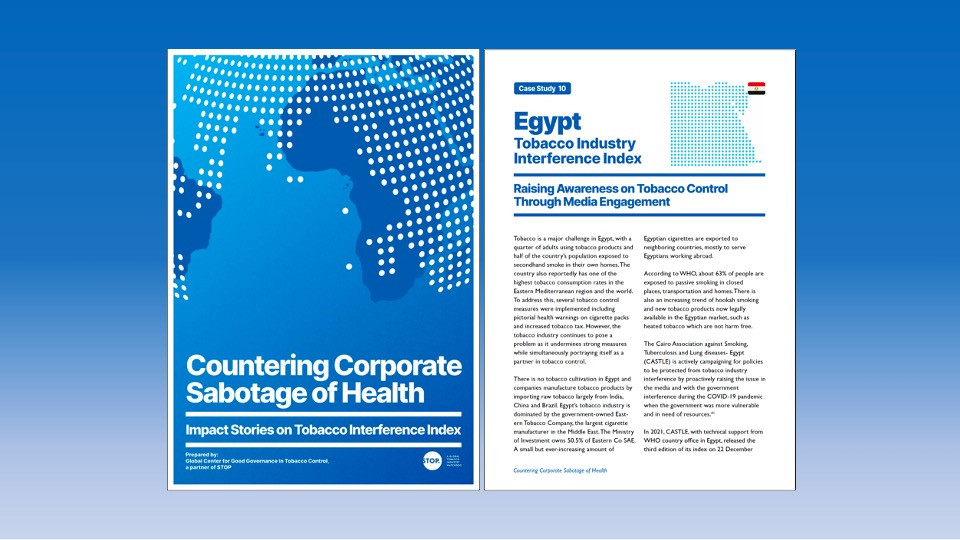Raising Awareness on Tobacco Control Through Media Engagement

“Keeping the public informed about the unacceptable practices of the tobacco industry in Egypt is a key strategy in the fight against tobacco. We are committed to record and inform everyone about the interference of tobacco industry and will always make sure that are exposed.”
Dr Amin Wagdy
Cairo Association against Smoking, Tuberculosis and Lung diseases - Egypt
Tobacco is a major challenge in Egypt, with a quarter of adults using tobacco products and half of the country’s population exposed to secondhand smoke in their own homes. The country also reportedly has one of the highest tobacco consumption rates in the Eastern Mediterranean region and the world. To address this, several tobacco control measures were implemented including pictorial health warnings on cigarette packs and increased tobacco tax. However, the tobacco industry continues to pose a problem as it undermines strong measures while simultaneously portraying itself as a partner in tobacco control.
There is no tobacco cultivation in Egypt and companies manufacture tobacco products by importing raw tobacco largely from India, China and Brazil. Egypt's tobacco industry is dominated by the government-owned Eastern Tobacco Company, the largest cigarette manufacturer in the Middle East. The Ministry of Investment owns 50.5% of Eastern Co SAE. A small but ever-increasing amount of Egyptian cigarettes are exported to neighboring countries, mostly to serve Egyptians working abroad.
According to WHO, about 63% of people are exposed to passive smoking in closed places, transportation and homes. There is also an increasing trend of hookah smoking and new tobacco products now legally available in the Egyptian market, such as heated tobacco which are not harm free.
The Cairo Association against Smoking, Tuberculosis and Lung diseases- Egypt (CASTLE) is actively campaigning for policies to be protected from tobacco industry interference by proactively raising the issue in the media and with the government.
In 2021, CASTLE, with technical support from WHO country office in Egypt, released the third edition of its index on 22 December through a Zoom conference and launch livestream. It was spearheaded by its former chair, Dr Essam Elmoghazy.
The Index was well-covered by the media, garnering about 30 articles in the local press.
Egypt scored 64 points and was ranked 52nd out of 80 countries, indicating a lack of preventive measures to address industry interference in public policies. In the previous year, Egypt scored 61/100 in a survey of 57 countries. CASTLE monitored at least 30 incidents of tobacco industry-related interference from January 2020 to March 2021.
CASTLE called on the Ministry of Health to release the economic feasibility study for investing in tobacco control in Egypt. CASTLE also followed up on the government’s slow advancement efforts to combat smoking. The approval of the ban on consuming hookah in cafes during the Corona pandemic is still pending. CASTLE pointed to the importance of engaging with civil society organizations in combating smoking and their input should be considered in the drafting of the law to prevent harms of smoking.
The Index recorded a prominent tactic of the tobacco companies to exploit charitable work and link industry in a positive manner to society and government officials. When new tobacco control policies are placed on the government agenda, the positive image of tobacco related corporate social responsibility detracts attention from the real harm caused by tobacco use. The industry also exaggerates its economic contribution when it lobbies the government but the tobacco related losses incurred by society are ignored.
About CASTLE: Established in 1966, Cairo Association against Smoking, Tuberculosis and Lung diseases - Egypt (CASTLE) works closely with the National Tuberculosis Control Program to decrease the medical, social, and economic burden of the disease in Egypt. It works in different aspects of TB control such as research, patient support, health education, and human resource development
* GGTC pays tribute to Dr Essam Elmoghazy who passed away in January 2022 shortly after launching CASTLE’s Index. He was a gentleman and a pillar of strength to many in the public health community. It is privileged to have known him and be guided by his wisdom and experience. Over these past three years he showed his leadership through the Index and in setting up the Observatory that documents and exposes industry interference.
